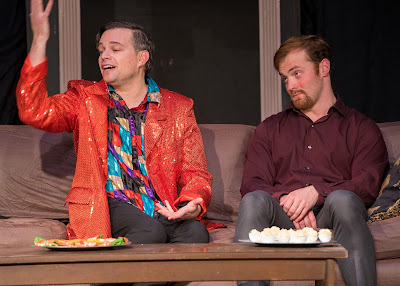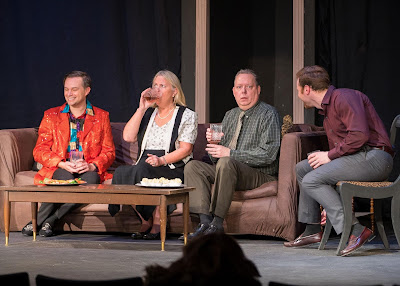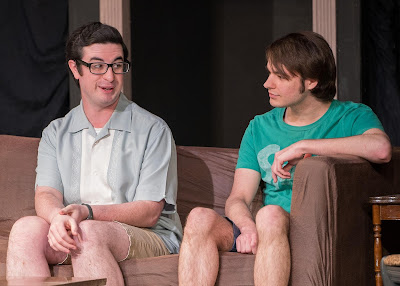By James V. Ruocco
"Straight Men Can't Dance," a new play by Craig David Rosen, tells theatergoers what it's like to grow up gay in the 1990s with all the joys, woes, confusion and chaos associated with homosexuality - coming out to friends and family; same sex marriage; first crushes; diva melts; lumps in the throat; fighting for equality; man-on-man sex; freedom of choice; prejudice in the workplace; etc.
The good news: It's not preachy. It's not full of itself.
It's also not halted by situations or moments that are too long, inappropriate or seismic.
This being a comedy, the accent is on humor.
Lots of it.
The plotline zeroes in on a gay male couple's teenage son's romantic, first-time dalliance with a nerdy high school friend who hasn't told his conservative parents that he prefers boys instead of girls.
They have consensual sex, which they both enjoy.
They start dating.
They have sex again.
Then, before you can say Bea Arthur and Angela Lansbury (both actresses are referenced in early parts of the play), it's time for both sets of parents to meet one another over drinks and dinner.
With the groundwork humorously laid, the plot thickens.
Who's gay?
Who's straight?
Who's confused?
Who's experimenting?
Who's ready for the big reveal?
Who's harboring a life-changing secret?
Will everyone live happily ever after?
Spoilers?
Not, a chance!
As entertainment, "Straight Men Can't Dance" is a hoot-and-holler laugh fest.
It tilts.
It swerves.
It delights.
It delivers.
It is voiced with pioneered giddiness.
It's Neil Simon, Harvey Fierstein, Mart Crowley, Michael Frayn, Patrick Dennis and Terrence McNally all rolled into one.
As playwright, Rosen skillfully handles the play's multiple scenes, characterizations, changes of pace and infectiously "queer" moments with irony, bite, reflection, sentimentality, surprise and in-your-face flourish. He knows how to write a line of dialogue. He knows how to tell a story. He knows how to pen and develop a character. He knows when to take a breath. He knows how to pause, halt, stop and go. He knows how to shock, surprise and titillate. He knows what works and doesn't work. He takes chances and runs with them.
He not only knows the gay vernacular inside out but includes plenty of playful, well-choreographed bits of dialogue and stage business for laughter's sake that has several of the play's homosexual characters calling each other "girl" or "she," throughout the two-act comedy.
According to the gay handbook, this catty banter is a "gender identity role" that's been played out "for centuries" by the homosexual populace. The gay man's love of Broadway show music is also bandied about, most amusingly.
Offensive, not really.
Funny?
Absolutely.
Here, high camp is a heavenly pleasure.
It is also well matched by Rosen's welcoming verbiage, his gay endorsements, his playful stereotypes, his gender-bending preening and prancing, his love of Broadway musicals and its leading ladies and finally, the fueled extravagance of his deliciously bonkers plotline. It's all diced, tossed, stirred and sorted with the creative savvy, challenge, wit and self-irony one expects from this sort of over-the-top entertainment.
Directorially, Rosen sets his play in motion with material that's flamboyant, open-faced, demanding, revealing and decades-past confident. Each scene is introduced via projections that offer hints of what's to come, backed by spirited dialogue and character exchanges that fit seamlessly into the progression of his ongoing story.
In terms of staging, he doesn't waste a move. He goes with the flow. He shakes things up. He dives in. He's clever. He's intuitive. He's mindful. He entertains. He charms. He giggles. He thinks outside the box. He also celebrates the stagey melodrama of it all with perfectly synced blocking and stage maneuvers that carry the story along engagingly and confidentially with nary a hiccup or misstep in sight.
Especially important here is Rosen's work with the actors themselves.
In order for "Straight Men Can't Dance" to resonate and barnstorm, he gives the cast important character traits, movements, behavioral patterns, expressions and overreactions that heighten their involvement in the actual storytelling. It's a conceit that not only adds dimension to the already proven material but is framed directorially by choice bits and bobs that are perfectly balanced, detailed, character-building and wildly interpreted.
"Straight Men Can't Dance" stars Rick Calvo as Stephen, Nick Smith as Rick, Collin Larson as Dexter, Kevin McNulty as Marc, Steffon Sampson as Paul (a), Lynn Nissenbaum as Bitsy and Billy Dempster as Winston.
As orchestrated by Rosen, the entire cast brings ceaseless energy to their wildly caricatured, stereotypical roles. Each and every one of them offer hilarious, sustained comedy performances that become even funnier (Calvo's character, for example, ends up in a trance for six to eight minutes once he becomes privy to the truth behind his son's sexual experimentations) as the action inches forward from scene to scene and act to act.
It's all precision drilled, breakneck speed comedy that spills across the stage with just the right amount of farcical momentum, buffoonery and roar necessary to keep the audience howling and howling with laughter. Working together as one, this incredibly talented ensemble never once misses a beat, a character tick or a snappy one-liner that celebrates the play's nonstop absurdity.
Inspired, wonderfully glib and fitfully entertaining, "Straight Men Can't Dance" dials up plenty of slapstick comedy and gate-crashing put-downs and one-liners to keep you giggling for weeks.
Playwright/director Craig David Rosen brings real inspiration and focus to this world premiere work about openly gay and not-so-openly-gay characters living in 1990's New Jersey - just a stone throw from Greenwich Village, the bohemian epicenter of LBGTQ life in New York City.
As penned and staged by Rosen, there's a lot going on, so to speak, with plenty of twists, turns, truths and surprises, all played out by his stellar seven-member cast with weighted merriment, boozy and bitchy demand and sourced up truism.
As theatre, it's high camp with plenty of rainbow-tinged theatrics and dynamics, lovingly curated by Rosen whose gift of the gab has such arch and sneer, it's hard to resist this alert, character-driven comedy romp and everything it has to say about society, about people, about homosexuality, about freedom of expression and finally, living life to the fullest by simply ripping up the rulebook.






No comments:
Post a Comment